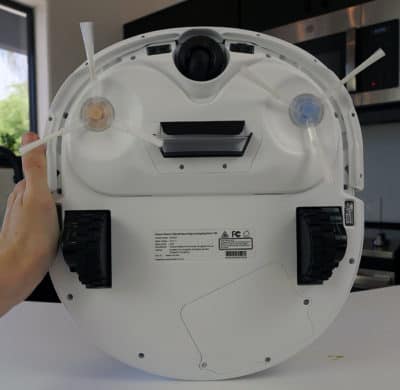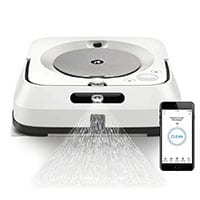2-Tank Robot Mopping System

Narwal T10
The Narwal T10 mopping robot is the first 2-tank system we’ve tested to date. It has a massive tank capacity with self-cleaning mopping pads. It also offers app control and also as a mop and vacuum (although performance isn’t great on carpet). Truly a bleeding edge robot mop and in our view, the best robotic mop on the market.Check PricePros
- Self-cleaning mopping pads
- Huge 5L water tank capacity
- 2-in-1 vacuum and mop
Cons
- Bulkier body style and base than other models
- Not great at vacuuming on carpets
Scoring
Self-Cleaning Robot Mop
-
Design - 98%
98%
-
Performance - 99%
99%
-
Quality - 96%
96%
-
Usability - 95%
95%
-
Value - 96%
96%
Summary
The Narwal T10 robot mop is the first 2-tank system we’ve tested to date and feels light years ahead of any other robot mop we’ve tested. It has a huge tank capacity, large area coverage, app control, and self-cleaning mopping pads. Areas where it needs more development include the improvements to the app, zoned cleaning, and vacuum performance (which didn’t perform well on carpets). Despite the drawbacks, it’s easily the best robot mop on the market and performed fantastic in our cleaning tests.
Table of Contents
If you would prefer to watch our review video instead of reading the review we have that below:
🧪 Performance
Our whole-home cleaning tests were fantastic overall. While there were some hiccups during setup and with the navigation (mainly the no-go / blocking zones), once those kinks were worked out, it was pretty hands-off.

The Narwal pulled a surprising level of dirt, dust, and debris off the floors. As you can see in the dirty water tanks and the cleaning pads themselves.

Narwal Configurations
Depending on whether you’re mopping or vacuuming, there are two different ways to configure the Narwal T10.
Vacuum Mode

Mop Mode

- For vacuuming, there is a snap-in tray that has two spinning brushes. As it navigates, the spinning brushes pull debris into the central cleaning path and deposits it in the dust bin.
- For mopping, there are two spinning mopping pads that are soaked with clean water as it works. Once it is detected that the mopping pads are dirty, the Narwal will drive back to the dock, clean the pads, deposit the dirty water, and continue cleaning.
The Results
The cleaning performance itself is really impressive. It really does pull a surprising level of dirt and dust off the floors. This is the first mopping robot we’ve tested that feels like it could be a complete replacement to a traditional mop.
Vacuuming Hardwoods
99%
Vacuuming Low Carpet
44%
Vacuuming High Carpet
45%
Mopping Hardwoods
Great
The combination of spinning brushes, huge clean water tank, dirty water tank, and the ability to clean its own brushrolls work together to excellent cleaning performance.
Mopping Hardwoods
This performance test was a bit less of an exact science and more of a subjective assessment based on watching how the Narwal moves and the cleaning pads at the end of the cycle.

We set the mop loose in our house and watched it work. The image below shows the state of the dirty water tank after it completed a full home clean.

I was really shocked at just how dark the water is, indicating a surprising level of dust and dirt on our hardwood floors.
At the end of the cleaning cycle, we noted cleaning time, dirty water tanks, and the quality of the mopping pads.
Vacuuming Hardwoods
On hardwoods, the Narwal missed a couple of grains of rice and a few tiny pieces of kitty litter. As well as an extremely small pile in the corners, but even all combined it didn’t amount to a significant weight of debris.

Vacuuming Low Pile Carpet
As expected, a vacuum cleaner on carpet without a brushroll just isn’t a great performer. It missed most of the kitty litter and sugar, in addition to some rice.
Based on our carpet performance tests I think it’s fair to say that Narwal is a fantastic mop and a good sweeper, but not great for vacuuming carpets.

Vacuuming High Pile Carpet
When cleaning high pile carpet, we basically saw a nearly identical performance to low pile carpet.

These results only further reinforced my view that this is a fantastic mop and a good sweeper for hard surface flooring, but it’s not a replacement for a more typical robot vacuum or standalone vacuum cleaner.
The performance just isn’t there on carpets due to the lack of a traditional brushroll.
How do we test?
To put the Narwal to the test we ran it vs. mopping and vacuuming tests. For vacuuming, we tested on 3 different floor types, including:
- Engineered hardwoods
- Low pile carpet
- High pile carpet
We spread a mix of debris types including:
- Dry cereal
- Kitty litter
- Rice
- Sugar (granulated)
Testing Lane vs. Whole Home Tests
Like other models, we tested the Narwal in our traditional testing lane, which is ~3×5′ with baseboards at the edges to keep the robot in the course.
In this test, it struggled with navigation and kept turning off (we did eventually get it to finish), but when set loose in the house, it performed much better.
In my view, the whole home test is the most accurate representation of how this robot will perform / be used in the real world.
That being said, we did still want to include our testing results from the lanes.
Navigation
The Narwal T10 uses a LIDAR-based system to map and navigate around your home.
The mapping system is pretty good overall, though I don’t love the area blocking features.

Because there are no dimensional measurements for the blocked-off area it’s hard to tell exactly where it is in the room and how large the blocked area needs to be. So you end up sort of guess and checking it until it’s right.
How fast is the T10?
I will say, the system is pretty quick to map. It needs to run a mapping mode with the vacuum attachment first to figure out what you’re home looks like.
But it goes much faster than expected, 30’ish minutes to map around 2,600 square foot home.
That being said, generating a fast map doesn’t mean that it’s quick to perform a full cleaning cycle.
In fact, the robot cleaning cycle is fairly slow.
The first full clean on our house took 6.8 hours (~2,800 square feet cleaned). The second full clean took 4.4 hours (~2,800 square feet).
So it definitely seems to be getting better in terms of efficiency, but it’s still fairly slow. Despite the slowness, it does seem to do it all on a single charge. The robot doesn’t need to do a recharge and resume.
A reasonable percentage of the slowness can probably be attributed to the cycling style.
Here’s how it works
- Mop leaves the dock
- Cleans until the mopping pads are dirty / water on the pads is gone
- Mop returns to dock
- Cleans pads and gets fresh water
- Goes back out to clean again
Over the course of a cycle it will need to go back to the base station several times to repeat this process. The larger your home the more times it will return to the dock. This definitely adds cleaning time vs. more typical robot vacuum / mops.

The navigational logic of the Narwal is interesting. Once you’ve started a cleaning cycle it seems to send the robot to the furthest room and then methodically work its way back towards the base.
As a final navigation note, this mop isn’t great at climbing and it got stuck on bar stool legs. It’s not terribly surprising, as many robots can get stuck on these types of legs.
I ended up creating no go zones around the bar stools and a dresser, both of which it was getting stuck on / under. In addition, I blocked off a carpeted area, so it wouldn’t clean there while mopping.
🧬 Design
The Narwal T10 is a robot vacuum that has a bit of a different approach to cleaning than what we’ve tested in the past.
What does it look like?
It has somewhat of a D-shaped body style, but not quite as pronounced as the Roomba S9 or the Neato BotVac D7.

The top of the Narwal has a LIDAR-based imaging system for navigation, as well as a simple “start / pause” control button.
There is a flexible bumper on the front which prevents damage to the mop or its surroundings as it bumps around.
The Underside
The bottom of the Narwal can be configured as a vacuum or as a mop. For mopping cycles, click in the self-cleaning mopping pads. For vacuuming cycles, click in the vacuuming attachment with dual spinning brushes.

The Narwal lacks a traditional brushroll, which is why the performance on carpet isn’t great, but it can clean up large debris at a decent rate.
Vacuuming Attachment

Mopping Pad

When you want to swap tools, there are two magnetic connection pins that are compatible with the attachments so it’s quick and easy to swap out the attachments for different configurations.
What does it do?
Many times we test robots that primarily vacuum, but also have add-on mopping pads.
The T10 feels like the inverse—mainly a mop that also has an add-on vacuum attachment.

This is the first robot mop we’ve tested so far that has a two-tank system, which allows for much better performance and cleaner floors.
The Dock
The docking station is a large white glossy base and is quite tall. The top has some simple controls for starting or stopping cleanings and sending the robot back to the dock.


On the inside of the dock, there are two large 5L water tanks. This 2-tank system allows the Narwal to separate wastewater and clean water for each cleaning cycle.

When the Narwal returns from cleaning, it will automatically clean the mopping pads and deposit the dirty water into the appropriate water tank.

Size & Dimensions
The size of the Narwal T10 is quite a bit larger than other models we’ve tested to date. This is especially true for the docking station.
Dimensions of the mop are:
- Depth: 13.6″
- Width: 12.4″
- Height: 4.3″
- Weight: 8 lbs

Dimensions of the dock are:
- Depth: 12″
- Width: 15.5″
- Height: 17.5″
- Weight: 17 lbs (empty tanks)

Accessories & Parts
The Narwal T10 comes with a large array of parts and accessories. The complete list includes:
- Narwal Robot Mop & Vacuum
- Narwal Base Station
- Power Cord
- 2x Mop Module
- 4x Mop Pad
- Sweeping Module
- 4x Brush
- Washboard
- Washboard Brush
- Dirt Bin
- Dirt Bin Brush
- 2x Water Tank (5L)
- Detergent
- Magnetic Strip
- User Manual

Mopping Pads
There are two parts to the mopping pads for this system. Two attachmnets that magnetically connect to the underside of the Narwal and then four washable mopping pads.


This system is designed to wash the pads at the docking station, but you can also wash them yourself as well.
The docking station does a pretty good job of washing the pad, but it’s not 100% clean. In the image below you can see the pad on the left is brand new and the pad on the right has been washed by the dock.

It’s significantly cleaner than a dirty pad right after cleaning, but not perfectly restored to like-new or anything.
Vacuuming Attachments
Here’s another closeup of the vacuuming attachment. This tool magnetically attaches to the underside of the Narwal and the spinning brushes direct debris into the central collection tray in the middle of the unit.

In addition to the vacuum tray, there is also an on-board dust bin with removable HEPA filter.

Cleaning Liquid
Narwal provides a small amount of cleaning detergent you can add to the clean water for improved performance.

In the image above you can see the level of dirty removed in the dirty water tank after the Narwal completed a cleaning cycle on my home.
👍 Usability
The Narwal T10 is easy to setup and use. Out of the box, it is more or less ready to go.
You’ll need to:
- Remove all original packaging.
- Install relevant tools (ex: vacuuming brush or mopping pads).
- Fill the clean water tank (for mopping cycles).
- Plug in the docking station and set to charge.

There are cleaning buttons directly on the mop itself or you can access advanced features via smartphone app.
From the mop, you can:
- Start a cleaning cycle.
- Send back to the charger.
- Spot clean a small area.


Using the App
Overall, the app feels a little underdeveloped. To its credit, the Narwal is just coming off of crowdfunding, so that’s a bit to be expected.
Just a few issues that come to mind:
- No scheduling in the app
- Blocking zones are hard to place without dimensions on the boxes / room and/or other markers
- No way to do more / less water on the mopping pad
- No varied modes for mopping
Maintenance
For cleaning cycles to work on the Narwal, you’ll need to keep the clean tank relatively full and the dirty water tank empty after the cycle is complete.

The mopping pads are self-cleaning so you don’t have to worry about that unless you want them spotless (like-new). However, I would still throw them in the washer every week or so when you run a load of towels.
Lastly, you’ll need to empty the dust bin and clean the HEPA filter if you run vacuuming cycles.

All in all, maintenance is pretty simple though.
🔰 How Does It Compare?
Wondering how the Narwal T10 compares to other robot mops on the market?
In short, the T10 is extremely unique to other models that we’ve tested. It is the only model here that has a self-cleaning mop pad system.
Cleaning the pads in the middle of the cleaning really helps to ensure that the pads are not just spreading around dirty water, but actually cleaning the floor.
In addition to the mopping pads, sheer capacity is another huge difference. The Narwal T10 is the only 2-tank system we’ve tested to date and the 5 liter capacity for clean water is 10X the capacity of the Braava Jet m6 and over 16X the capacity of the tank on the Roborock S7.
These numbers really show that the T10 is in a league of its own when it comes to robot mop performance.
Braava Jet m6 vs. Roborock S7 vs. Narwal T10
| Feature | Braava Jet m6 | Roborock S7 | Narwal T10 |
|---|---|---|---|
| Mode | Mop Only | Vacuum + Mop | Vacuum + Mop |
| Dust Bin Capacity | NA | 0.47 liters | 0.4 liters |
| Mop Tank Capacity | 0.48 liters | 0.3 liters | 5 liters (x 2 tanks) |
| Self-Cleaning | No | No | Yes |
| Mop Coverage | Recharge + Resume | 2100 sf. | 2150 sf. |
| App Control | Yes | Yes | Yes |
| No-Go Zones | Yes | Yes | Yes |
Narwal T10 Specifications
| Narwal T10 | |
|---|---|
| Model |  |
| Dimensions | 12.4" x 13.6" x 4.2" |
| Dust Bin Capacity | 0.4 liters |
| Mop Tank Capacity | 5 liters (x 2 tanks) |
| Mopping Performance | 99% |
| Self-Cleaning Mop Pads | Yes |
| Self-Cleaning Time | 75 seconds to clean |
| Suction Power | 1800Pa |
| Charge Time | 2.5 hours |
| Coverage | 2100 sf. |
| Warranty | Unlisted |
| Price | Check Price |
Who Should Buy the Narwal T10?
Overall, I really like this robot. As far as a mop goes, I think it’s easy the best on the market and it’s pretty close to a complete replacement to a traditional mop.
The area where a traditional mop is still going to be needed would be for soaking up huge messes and/or lots of debris. Outside of that, this takes the place and most of the functions a normal mop is going to do.
Although it’s technically a 2-in-1, I wouldn’t say that this model could replace a vacuum. Performance on carpet is just not there.
The app is underdeveloped, but I would expect it will see improvements over time. Despite my complaints about the app and the limited vacuuming performance, this is a fantastic mop and a product I will absolutely continue to use.
We would recommend the Narwal T10 to users who want:
- An excellent robot mot: The T10 does a lot of things right and breathes a breath of fresh air into the robot mop market. Instead of being a robot vacuum with a side of mediocre mopping, the Narwal is an excellent mop with a side of vacuuming. If mopping is your top priority, the Narwal T10 is a fantastic option.
- XL water tanks: There are two huge water tanks for the Narwal, with a capacity of up to 5 liters. This is the first robot mop we’ve tested that features separate tanks for clean water and dirty water.
- Self-cleaning mopping pads: The self-cleaning mopping pads are another huge win for the Narwal. As the pads get dirty, it will automatically return to the dock, scrub them clean and deposit the dirty water in the dirty tank.
For more information or to buy the Narwal T10, check it out here.
ChangeLog
- April 30, 2021 – Initial version of the page was published.



